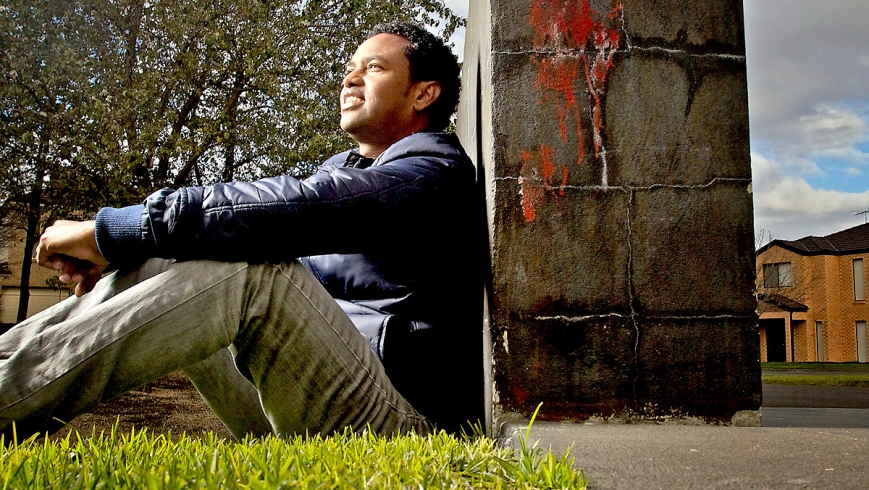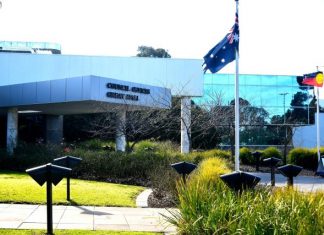THE quietly spoken Abdi Aden tells a terrifying story in a voice so calm you can’t imagine the horror he endured as a teenager dodging bullets fired by killing parties hunting him down.
He could be reciting a shopping list as he tells of companions gunned down, but his voice becomes passionate when he speaks of Prime Minister Kevin Rudd’s solution to boat people.
“No one flees their country unless they have to,” he says. “No one sets out on the ocean to die.”
Aden knows from experience: in 1991 he was a 12-year-old playing soccer after school in Somalia’s capital, Mogadishu, when bombs started falling and life as he knew it shattered.
Now 37, the Craigieburn father of three boys aged five to 10 says he is lucky to be alive after civil war gripped his former homeland, launching him adrift.
He says he was one of a group of about 300 who fled Somalia in 1991 and saw his companions picked off by gunmen and animal predators, including lions, leaving only a handful to survive.
“I was one of only five to survive and arrived in a refugee camp in Kenya almost four months and about 500 kilometres later after leaving Somalia,” he says.
“At the time I was a kid on my own except for a [neighbour] woman who had five kids.
“We buried four of them on the way to Kenya and left her behind as well because she said she couldn’t walk any more, but her [surviving] son and I made it to Kenya.”
Aden has just quit work as a Whittlesea council youth worker to concentrate on his own Northern Youth Services project, Inspire by Abdi, which advocates for the needs of teenagers through programs, excursions, forums, casework and support networking.
He is also a popular public speaker after he featured in the SBS series Go back to where you came from, in which he told his life story.
Going back to Somalia is no longer an option for Aden, who did return briefly after he first fled Mogadishu. “I went back after a few months in Kenya to see if I could find my parents; they weren’t there. I have since found my mother but been told my father is dead, while my sister is alive in London. There is nothing in Somalia for me now.”
With the help of the Red Cross, he found his mother living in a Kenyan refugee camp where she had adopted nine children. Aden sponsored them to come to Australia and they now live close to him.
Aden’s memory of his first escape from Somalia is still painful. “We saw people die, but we had to keep moving,” he says. “There were people with guns hunting us, then there were the animals. Apart from the big cats, we heard the hyenas at night and they wanted [to eat] us.
“There were armed militia and government troops on the roads, so the roads were dangerous, but going into the bush put us in the path of animals that would eat us.”
After his brief return to Somalia, Aden fled to Romania where he lived for 18 months as a gypsy. He then went to Germany and arrived in Australia in the early 1990s on a tourist visa. The penniless, homeless 15-year-old applied for permanent residency on humanitarian grounds – which he was granted.
“I lived on the streets and in homeless shelters and on the couches of friends who I will never forget,” he says.
“At 15 I didn’t know much. But I had friends and survived; when I was homeless [in Melbourne] and had nowhere else to go, I would catch trains and sleep, taking a train to Frankston or other outer suburbs.”
After gaining permanent residency, Aden finished secondary school, then university, working part-time jobs to support himself.
“We asylum seekers have something to offer,” he says.
“Boat people must be very desperate to brave rough seas at night; they must be escaping persecution.
“We have to have the Australian and Indonesian governments talk together to find a solution where children are not left to die in the [sea].”
Aden says people must look at the issue in terms of humans – young, old, infirm and like himself decades ago, “desperate”.
“When I fled Somalia, people were firing bullets at us – they wanted me and the others fleeing dead. But I survived for a reason. I am here to tell people what happened in my homeland. I am passionate about changing people’s opinions about asylum seekers, why we come and what we can offer. I am very lucky that I can empower the community about refugees.”







